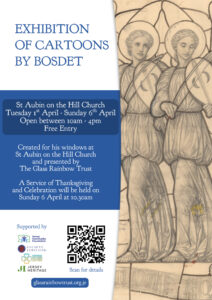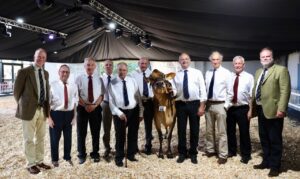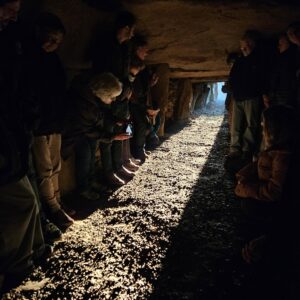
By Jersey’s celebrated explorer, Colonel John Blashford Snell CBE. A tale (tail?) for the New Year. This appeared in the current issue of RURAL magazine. It can be read there, or else ‘virtually’ on the ‘Past issues’ of this website (Issue 37) www.ruraljersey.co.uk/past-issues)
Born in St. Helier, my father, The Reverend Prebendary Leland Blashford Snell, enjoyed his time at Victoria College where he was a keen cricketer. Thereafter, he decided to take Holy Orders and after marrying my mother at the Town Church, sailed for New Zealand. Ordained at Dunedin Cathedral, he also became a chaplain in the New Zealand Territorial Army.
On return to Jersey in 1930, he became curate at the Town Church and my mother ran the Blue Cross Animal Shelter. They both loved animals, especially dogs and had a favourite Alsatian, Peggy, a strongly built sable-coated bitch, whose party trick was to pick me up by my nappies when, as a baby, I tipped myself out of the pram. She would then carry me, bawling my head off, into the house.
In the Territorial Army, Father was nicknamed ‘Bish’ and in 1944, was senior chaplain with the 53rd Welsh Division in France. As the Allies pressed forward from the beaches of Normandy, a large part of the German Army became trapped in a ‘pocket’ at Falaise. With their backs to a river and orders from Hitler to hold on regardless, they were surrounded on three sides and systematically destroyed as the pocket closed in. The fighting was bitter and confused, opposing units became inextricably intermingled and casualties were heavy on both sides.
One infantry company, having attacked the German defences, was itself pinned down between two minefields and unable to move. The men dug in and fought for their lives. By late afternoon on the second day of their struggle they had suffered many dead and wounded. As a chaplain, Bish decided to try to get through to them with an armoured ambulance carrier and some stretcher bearers to bring the wounded out. Mortar bombs were still falling as the carrier wound its way towards the isolated soldiers, However, they got through and the stretcher bearers collected the wounded, while Bish gave the last rites to those who would not make the hazardous journey back.
Suddenly, there was a metallic bang and a plume of black smoke drifted up from the carrier. ‘He’s hit a mine,’ yelled the medic and, indeed, that was what had happened as the driver reversed to make the return trip. Suddenly, all hell broke loose as the Germans seized a farm to the rear of the British position, cutting off their retreat.
‘There’s only one way out, Padre,’ said the Company Sergeant Major, ‘through the minefield on our south side.’ Bish eyed the deceptively innocent grass, waving in the evening breeze, that fluttered the little triangular yellow flags with their black skull and crossbones marking the perimeter of the German minefield. ‘I wonder if there’s a safe lane through it,’ he thought, and crawling forward with a stretcher bearer, peered through the splinter-slashed remains of a low hedge. A slight movement caught their eyes. To the left, about a hundred yards away, stood a wrecked cottage. It was little more than a pile of masonry, but coming out of the ruin was a beautiful Alsatian, its pale coat a perfect camouflage amongst the grey stones. But as it reached the grass, it stood out, almost white in the fading light and then, to their astonishment, the dog trotted confidently into the minefield and crossed the meadow. Reaching the far side, the Alsatian turned, pricked her ears and looked back towards Bish.
I say ‘her’, because by now my father was quite convinced that this was his long-dead Peggy – the likeness was uncanny. He gave a low whistle and to his joy the bitch bounded across the minefield. ‘Get the wounded,’ he hissed to the stretcher bearer.
‘We can’t go through there, Padre,’ said the NCO, ‘It’s bloody well mined.’
‘Yes we can,” insisted Bish, ‘If we don’t, half those casualties will die.’
So, with darkness falling in the warm summer evening, they set out through the knee-high grass, fearing that every step would be their last. Crouching low, they hardly noticed the weight of their load as the staggered along, eyes probing ahead for tell-tale signs of earth disturbance. The ominous little pennants swayed in the near-still air. The sounds of battle had died with the day, but no birds called in this field of death. Bish led, urging ‘Peggy’ forward and when she stopped and looked back, ears pricked, mouth part-open, pink tongue slightly out, he urged her on.
‘Good dog, seek, seek it,’ he kept saying. The stretcher bearers may have thought him mad, but they followed, knowing the lives of the wounded depended on their getting through. It was only a couple of hundred yards to the tree-line that marked the far side of the minefield, but it seemed like a mile.
Twice they saw the dreaded horns of ‘S’ mines protruding from the soft soil – one touch would be enough to send this killing machine bounding into the air with a deceptively gentle pop, to explode at head-height, hurling steel ball-bearings over a hundred-yard circle, decapitating anyone standing nearby. Then they were there, past the markers, putting down the stretchers, slapping each other on the back.
‘Keep going,’ hissed the chaplain, ‘I’ll catch you up.’ So saying, he ran after their saviour, now bounding away towards an old barn. At the empty double doorway, the dog paused and looked at the panting padre. The light had almost gone, but he saw his ‘Peggy’ cock her head on one side as she had done so many times in England, then she dashed inside the solid wooden building.
Bish reached the door – it was pitch black inside, the smell of hay and manure wafted out.
‘Peggy!’ he called, ‘Come here, girl.’
There was no movement within and he delved into his first-aid bag for his little dynamo torch. Squeezing the trigger repeatedly, he flashed the light about, probing the dark corners of the barn. It was quite empty and there were no other doors nor exits of any sort. ‘Peggy’ had gone just as she had come.
Bish felt a tear run down his grimy cheek and he paused just long enough to thank St Francis of Assisi for saving the lives of the wounded that summer’s evening.
When war ended, he returned to his parish in Herefordshire and regularly held a service for the animals on St. Francis’ Day. I remembered these services well, because I took my guinea pigs. They usually escaped, causing chaos.





